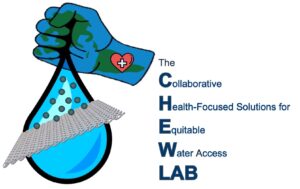
The detrimental effects of climate change on the supply, demand, and quality of water resources cannot be overstated. Droughts exacerbate water shortages in water-stressed regions, whereas rising sea levels threaten to salinize freshwater resources. Ensuring regular access to safe, sustainable drinking-water supplies is a critical climate change mitigation strategy for the years ahead. Yet, many of our already scarce water resources are contaminated with legacy (e.g., arsenic) and emerging (e.g., per- and polyfluoroalkyl substances (PFAS)) pollutants; their environmental distribution and entrance into waterways pose a huge threat to public health, potentially causing adverse health outcomes. The looming water crisis is further compounded by the large quantities of water used in energy exploration and extraction activities such as fracking, generating toxic wastewater in the process. Unfortunately, when it comes to safe drinking water in America, race still matters; municipal under-bounding gerrymanders the reach of municipal water to exclude lower-income communities that typically have large Black populations, creating inequality in clean drinking water.
The overarching goal of my research is to advance membrane technologies and material innovations to combat issues facing overburdened, marginalized communities at the water–energy–environment–health nexus. To accomplish this, I seek to develop membrane technologies to effectively harvest valuable resources from unconventional water sources (i.e.,seawater, wastewater) by elucidating structure–property–performance relationships under operational-realistic conditions, and applying this knowledge to design improved membranes. However, water-production processes are generally energy-intensive. Hence, membrane technologies that utilize low-grade or waste heat to desalinate (hyper)saline waters will be the center of my attention. I am also interested in utilizing unprecedented physio-chemical properties, through the surface-engineered application of novel materials that include polymers and metal-organic frameworks (MOFs), to address environmental challenges and public health concerns particularly focusing on developing novel granular sorbents for PFAS and arsenic removal. In my work, I employ an interconnected, three-pronged approach: (i) Develop/modify materials and related applications; (ii) elucidate/model structure–property–performance relationships; and (iii) develop/improve material-characterization methods.